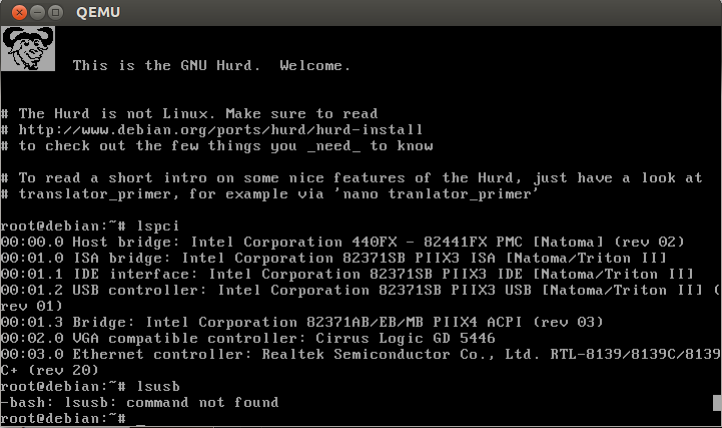While I have been using Linux for a number of years I only recently discovered the existance of the Hurd.
To understand why everyone should be using ONLY ‘free’ software, (i.e. software that gives us the 4 freedoms) you should watch this video:
Not ‘free’ as in ‘free beer’, ‘free’ as in ‘freedom’ -RMS
I would like to work on getting USB hardware support and Audio into the Hurd because let’s face it, everyone loves listening to music and what could possibly be better than a totally ‘free’ operating system that can play and record high quality audio?
Microkernel layout looks like this according to wikipedia:
For those interested in developing USB support for the Hurd, you can run the Hurd in a virtual machine and attach a physical USB device to it using the following commands:
USB Pass-Through for qemu running the Hurd:
To assign an existing host USB device to a VM Guest, you need to find out its host bus and device ID.
tux@vmhost:~> lsusb
[...]
Bus 002 Device 005: ID 0dba:3000 Digidesign Mbox 2
[...]
In the above example, we want to assign a USB sound card connected to the host’s USB bus number 2 with device number 5.
Run the VM Guest (Hurd) with the following additional options:
qemu-system-i386 -m 512 -usb -device usb-host,hostbus=2,hostaddr=5 -net nic,model=rtl8139 -net user,hostfwd=tcp::5555-:22 -drive cache=writeback,index=0,media=disk,file=$(echo debian-hurd-*.img)
PCI Pass-Through
PCI Pass-Through is a technique to give your VM Guest exclusive access to a PCI device. I believe it would be useful for setting up a virtual environment for developing more PCI hardware support for the Hurd.
